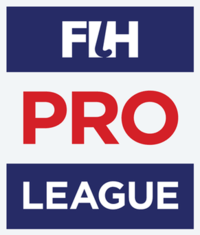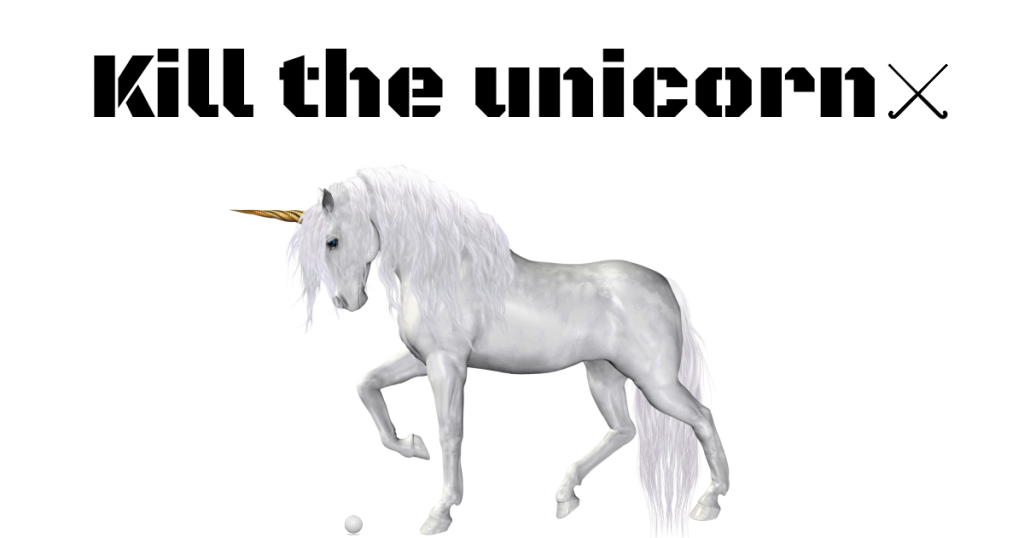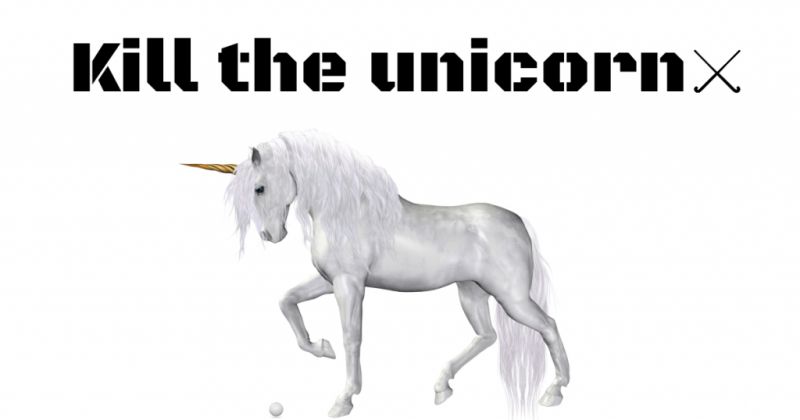
Sometimes you just have to kill the unicorn… before it kills you. No, do not fear… We haven’t gone off topic. We’re not doing fairytales, nor are we in the business of animal cruelty. A unicorn in this context has been defined by experts in innovation as one of these idea’s during a brainstorm session that should not be followed through upon.
The quote below is from Mark Payne, founder of a company specialised in innovation consultancy :
Mark Payne – in “How to kill a unicorn”
The key question posed over and over is “Okay, but what must be true for that to work?” It’s a powerful question, one that quickly separates high-potential ideas from the blizzard of distracting ideas that can result in lost traction. If that list of “what must be true?” is kind of long, the idea may be a long shot. If it’s extremely long and laden with monumental barriers, we label that idea a “unicorn”: lovely to think about, but doable and profitable only in an imaginary world. We’re out to build big ideas and make them real. Big and absolutely impossible isn’t big. One of our important steps to success, in other words, is to kill off the unicorns or at least cordon them off in their own private pasture.
FIH Pro League

So yes, I am talking about the FIH Pro League! Because let’s be honest about it after more or less half of the games played in it’s maiden season. On field it has been fun so far. Lots of spectacular results, Spanish come back dramas and on occasion some good hockey as well. But the execution of the original idea has been below par to say it nicely…
The FIH Pro League has had its opponents and supporters from way before it even got launched. I admit to have been on the fence somewhat for a while. But I really liked the idea, the concept of “hockey is coming home”. So you can count me among the supporters of the Pro League. However that doesn’t mean I will turn a blind eye for all that’s wrong.
[tweet_box float=”right” width=”60%” design=”box_09″]Players, coaches and officials making the sacrifices are not compensated for their effort. Rather disappointing for a league who wants to be know as pro…[/tweet_box]
I guess a lot of marketing eyes were focussed on the concept before its launch and I’m sure someone would have made some calculations regarding financials and did a feasibility analysis as well. I know outside consultancy was asked and the decision makers did get at least one, but probably multiple, offers from third parties willing to manage the event while guaranteeing a certain income for the FIH. This could have trickled down to NA’s (= national associations) and especially players, coaches and officials making the sacrifices that come with the launch of a global league. However the board decided to go at it “alone” without having secured any partners or sponsors. So this ambitious and expensive (!) event started without a sufficient and confirmed budget as far as we know. All financial burden fell towards the participating NA’s… Players, coaches and officials making the sacrifices would not be compensated for their effort. Rather disapointing for a league who wants to be know as pro…
Recently all interested parties gathered in the USA and discussed necessary changes. India had left the fold before the Pro League even got underway. Pakistan, in their own special way, kept the faith. Only when the bill for the first airplane & hotel tickets arrived at their federation they realised the money had gone. Not able to take on their first opponents they were kicked out and await either a long suspension, a big fine or both… if (!) the rules are respected. In the US the administrators decided India would take the Pakistani spot as of 2020 and the format would change somewhat to diminish travel and costs. Click here to read the FIH statement about this.
Pro
Home games
The biggest pro of all is without a doubt the home games. Every game is played in front of a home crowd. We’re still a long way from the major spectator sports but at least this also means no more empty stadiums in most games.
Yes of course, if NA’s have to fill their stadiums with kids from schools to fill the empty seats it’s not something to be proud of. But without any budget from FIH (because they refused the sponsors willing to pay) it’s a tough job for the smaller NA’s to do a proper marketing job and sell these games to the general sports fans in their area.
Scheduled games
It seems strange to have to qualify a schedule of games a year ahead as a plus. But with the poor performance by the FIH in the past on this simple but important element we have to acknowledge this as a plus for the Pro League. The schedule is known at least a year ahead of time. And why not pencil in all games for the next 3 years as well? Being able to plan and schedule for several years will help coaches set up better planning for their national teams and NA’s to schedule their own events and leagues knowing the constraints of the Pro League.
Hockey all year around
For those among us who really follow the sport and not just our own team or country it is as wonderful thing to see some tophockey being played all year around. Between January and June with the Pro League, plus some of the other major events such as European Championships, World Cups or Olympics during the summer months. And let’s not forget the top domestic leagues between September and December (for some continents) or June (for Europe). That’s a lot of hockey for the enthusiasts…
Contra
Killing the existing domestic leagues
Due to poor planning the burden of this Pro League put on our existing domestic leagues is heavy, too heavy. For short domestic events like the HIL in India or the AHL in Australia (now rebranded as Hockey One) it’s more easy to reschedule to avoid a conflict with the Pro League. But the traditional European domestic leagues run between September and June. Clubs, according to me still the foundation for our game of hockey, are dependent upon these longer running leagues. It is the way we play hockey… Changing this without true consultation or a new plan is killing for the existing domestic leagues such as the Dutch Hoofdklasse, the German Bundesliga or the Belgian Honour Division.
I still think, as I’ve written before, the easiest solution for this would be to divide the year in 4 quarters. December – February and June – August for international hockey. And March – May plus September – November dedicated to domestic club hockey. That way international hockey for national teams could be played in the southern hemisphere between December and February and in the northern hemisphere during our summer months. The remaining 6 months of the year would be exclusively dedicated to club hockey and both could live in harmony reinforcing each other instead of competing.
But whatever the solution chosen, the domestic leagues need to be respected and given their dues because these are the bedrock of hockey.
Unfair burden on players, coaches and officials
Because the FIH, for some dark reasons, chose to start the Pro League without the support of any sponsors and without sufficient budget to make good on their original “promises” it’s the players, coaches and officials who suffer. Some NA’s provide their national team players with some kind of income. With the possible exception of India however, none of these players will be set for life for having been a professional international hockey player. In most cases it hardly reaches the minimum income to support a household. But some countries (small and big in terms of hockey) do not pay their players at all for their time spent in the national team. Nothing, zero… Sure their costs are covered in most cases. But they’re expected to play for the honour of representing their country. Which is acceptable if this involves a couple of games and a couple of weeks of training every year. But not acceptable when it becomes a part time job which has a major impact on their full time life…
FIH promised the Pro League would make our athletes full time professionals able to live from and for their sport. So far for most teams it has doubled the required efforts for these players without any increase of income… That’s unfair! That’s breaking promises!
As a result we now have top international players who need to play for a European club to earn a basic income to pay for a roof over their head and the food on the table, besides making sure (through studies or preparing in a different way) their future income is also guaranteed for when their playing days are over. But the demand of their national teams on these players has doubled at least without any (extra) income being generated by the Pro league.
Poor contracts with media
Middle-aged or old (wo)men are still the decision-makers and that’s why old fashioned broadcasting (TV) is still considered the holy grail. Instead of going for true innovation in the way we show the game the FIH still thinks TV rules. So with the Pro League in mind they agreed with a lot of broadcasters around the world to show this new event. Unfortunately they not only chose the wrong media but came to poor agreements with most of these broadcasters. So we’re still hearing from games not shown live by the local broadcaster but still being geoblocked on FIH media.
Honestly if a broadcaster will not guarantee all local games to be shown live (meaning the exact moment the game is being played, so not merely within 24hours of it being played) it is not worth entering the agreement with them. Games should be seen live at all times and full replays should be available at all times for all. If you can not guarantee this why bother… Besides this broadcasters should commit to adding extra value such as pre-game and post-game presentations with local experts (beyond the 2 minute stand up on field announcing the so called MVP nobody cares about). That’s the way to market your game… If local broadcasters can’t be bothered to do this because we are a niche sport, then don’t…. and do it yourself FIH !
No support from the ground floor…
FIH did not bother to secure the support from the ground floor, our current hockey fans, meaning those who are involved in recreational hockey themselves. Quite the contrary even, it seems the Pro League is not only lacking the support, but most of our recreational hockey players hardly even care… Yes, in some countries they will show up for some of the interesting home games, but will hardly see any of the games played in other countries.
That is caused by a lack of marketing selling the game of hockey. Which in turn is caused by a lack of budget because FIH turned down sponsoring offers to start this Pro League without the means to do so.
Conclusions… well my conclusions anyway 😉
I know I’m usually the outspoken critic vs the FIH and especially its administrators. But not all is their fault and theirs alone… Yes, some might say I’m getting soft at my old age 😉
Two major blows against a possible success for the Pro League so far were India pulling out after the launch but before the first game. And they were outdone by the usual rivals from Pakistan who managed to pull out of the league after the first games were played already as mentioned above… Still the FIH is headed by an Indian and Pakistan managed to secure a seat within the FIH board a couple of weeks before they had to confess not being able to participate in the Pro League after it had started already…
The cause? Poor political lobbying by Europeans where sport administration is still the playground for well meaning volunteers and stronger lobbying by Asian sports administrators. Making promises you know you will not be able to keep seems to be the easiest way to take control at the expense of the sport unfortunately!
 We will probably never know why the FIH chose to ignore existing offers of partners who would have delivered the budget to honour at least some of the promises made in launching this FIH Pro League. But without the budget and with all these hurdles along the way to make good on what was promised the idea of this Pro League should have been classified a unicorn and killed. Because now we run the risk of damaging our players and existing leagues…
We will probably never know why the FIH chose to ignore existing offers of partners who would have delivered the budget to honour at least some of the promises made in launching this FIH Pro League. But without the budget and with all these hurdles along the way to make good on what was promised the idea of this Pro League should have been classified a unicorn and killed. Because now we run the risk of damaging our players and existing leagues…
Maybe that has been the plan all along the way by some of these administrators. Using a failing FIH Pro League to push out our 11v11 game from the Olympics and replace it with their Hockey5s. I’m sure they will deny it but so far I’ve seen no proof of these sport administrators protecting the Olympic status of our 11v11 game…
If the FIH is serious about securing the Olympic status of our hockey for the future they need to make this Pro League a success and for this to happen they will need to secure long term sponsor contracts making sure they can live up to the promises made to their players, media partners and sports fans all around the world!
But let me repeat my advice from a previous column on this topic :
Domestic hockey is the key to succes!
[tweet_box float=”right” width=”60%” design=”box_09″]If you want to grow hockey in a sustainable way, you start with the foundation: domestic hockey![/tweet_box]
I know I’m looking at all of this through European glasses. But it’s about time the FIH & co learned a valuable lesson from those regions in the world (not just Europe) where we do have our act together.
The lesson is : “If you want to grow hockey in a sustainable way, you start with the foundation: domestic hockey, both recreational and topsport.”
Without a solid foundation in recreational domestic hockey we will never ever grow the viewers the FIH marketing department so desperately needs to secure and grow our game of hockey. It’s these recreational players who will be the foundation upon which they can build their desired public of general sports fans. But without a foundation it’s no use building anything…
Wether you agree or disagree? I welcome your views & conclusions in the comments below…
PS: No real unicorns were killed in the writing of this column 😉


